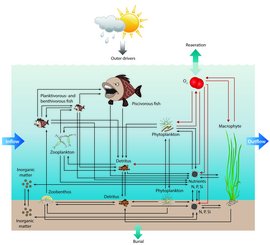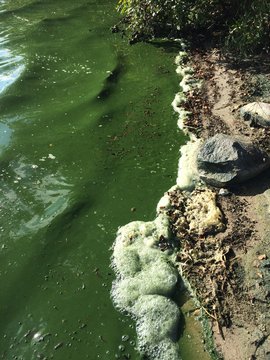About QWET
QWET is an open source QGIS plugin aiming to provide an easy-to-use tool for user adaptation and application of state-of-the-art aquatic ecosystem models, and model-based experimentation for research and management.
QWET was developed by Nielsen et al., at Aarhus University, Denmark, and is a Python based Graphical User Interface (GUI) for operating the coupled hydrodynamic-ecosystem model GOTM-WET.
QWET can run climate and nutrient load change scenarios, and estimate how these affect an individual aquatic ecosystem. QWET also include a series of optional management interventions, such as biomanipulation, which can help estimate potential effects of these before being implemented in practice. As an additional option, QWET can link to the SWAT (Soil & Water Assessment Tool) watershed model. This link enables assessments of how land use change scenarios created in SWAT affect aquatic ecosystems in QWET.
Brief background on the computational core of QWET: GOTM-WET
WET is a further development of FABM-PCLake by Hu et al., at Aarhus University, Denmark. Key features originate from the PCLake aquatic ecosystem model by Janse and van Liere (1995), but key features and inspiration from CAEDYM and Ecopath/Ecosim has also been implemented. For details relating to FABM-PCLake, please see: Hu, F., Bolding, K., Bruggeman, J., Jeppesen, E., Flindt, M. R., van Gerven, L., Janse, J. H., Janssen, A. B. G., Kuiper, J. J., Mooij, W. M., and Trolle, D. 2016. FABM-PCLake – linking aquatic ecology with hydrodynamics, Geoscientific Model Development 9: 2271-2278.
GOTM (General Ocean Turbulence Model) is a one-dimensional (water column) hydrodynamic model, originally initiated by Hans Burchard and Karsten Bolding, and further developed by a community of scientists over the past two decades.
FABM (Framework for Aquatic Biogeochemical Models) is a development by Bolding and Bruggeman ApS. FABM allows coupling of several hydrodynamic models, including GOTM and GETM, with a range of biogeochemical models, including WET, ERSEM and ERGOM. For more details in relation to FABM, please see fabm.net and: Bruggeman, J. and Bolding, K. 2014. A general framework for aquatic biogeochemical models. Environmental Modelling and Software 61: 249-265.
Help using QWET
Please use the "Issues" board available on the WET Gitlab page to exchange your ideas and issues about the use of WET with fellow WET users. Check the Issues board to see if your issue has already been discussed.
We can offer beginners workshops using the WET interface. Please review the Events page for workshop opportunities.

